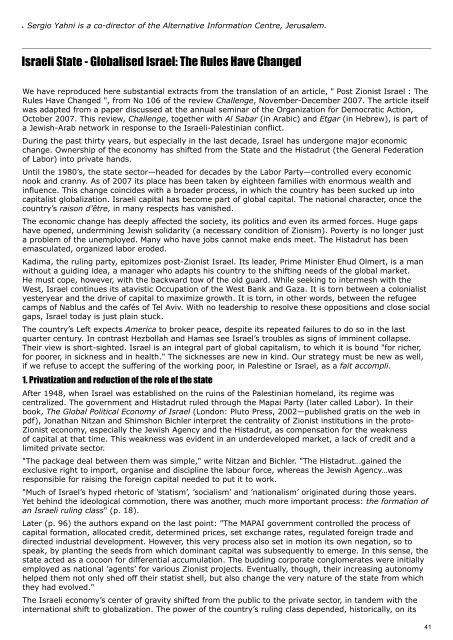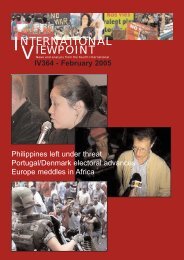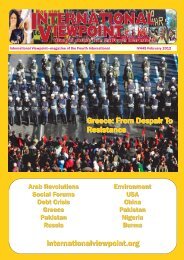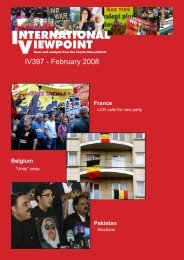here - International Viewpoint
here - International Viewpoint
here - International Viewpoint
You also want an ePaper? Increase the reach of your titles
YUMPU automatically turns print PDFs into web optimized ePapers that Google loves.
Sergio Yahni is a co-director of the Alternative Information Centre, Jerusalem.<br />
Israeli State - Globalised Israel: The Rules Have Changed<br />
We have reproduced <strong>here</strong> substantial extracts from the translation of an article, " Post Zionist Israel : The<br />
Rules Have Changed ", from No 106 of the review Challenge, November-December 2007. The article itself<br />
was adapted from a paper discussed at the annual seminar of the Organization for Democratic Action,<br />
October 2007. This review, Challenge, together with Al Sabar (in Arabic) and Etgar (in Hebrew), is part of<br />
a Jewish-Arab network in response to the Israeli-Palestinian conflict.<br />
During the past thirty years, but especially in the last decade, Israel has undergone major economic<br />
change. Ownership of the economy has shifted from the State and the Histadrut (the General Federation<br />
of Labor) into private hands.<br />
Until the 1980’s, the state sector—headed for decades by the Labor Party—controlled every economic<br />
nook and cranny. As of 2007 its place has been taken by eighteen families with enormous wealth and<br />
influence. This change coincides with a broader process, in which the country has been sucked up into<br />
capitalist globalization. Israeli capital has become part of global capital. The national character, once the<br />
country’s raison d’être, in many respects has vanished.<br />
The economic change has deeply affected the society, its politics and even its armed forces. Huge gaps<br />
have opened, undermining Jewish solidarity (a necessary condition of Zionism). Poverty is no longer just<br />
a problem of the unemployed. Many who have jobs cannot make ends meet. The Histadrut has been<br />
emasculated, organized labor eroded.<br />
Kadima, the ruling party, epitomizes post-Zionist Israel. Its leader, Prime Minister Ehud Olmert, is a man<br />
without a guiding idea, a manager who adapts his country to the shifting needs of the global market.<br />
He must cope, however, with the backward tow of the old guard. While seeking to intermesh with the<br />
West, Israel continues its atavistic Occupation of the West Bank and Gaza. It is torn between a colonialist<br />
yesteryear and the drive of capital to maximize growth. It is torn, in other words, between the refugee<br />
camps of Nablus and the cafés of Tel Aviv. With no leadership to resolve these oppositions and close social<br />
gaps, Israel today is just plain stuck.<br />
The country’s Left expects America to broker peace, despite its repeated failures to do so in the last<br />
quarter century. In contrast Hezbollah and Hamas see Israel’s troubles as signs of imminent collapse.<br />
Their view is short-sighted. Israel is an integral part of global capitalism, to which it is bound "for richer,<br />
for poorer, in sickness and in health." The sicknesses are new in kind. Our strategy must be new as well,<br />
if we refuse to accept the suffering of the working poor, in Palestine or Israel, as a fait accompli.<br />
1. Privatization and reduction of the role of the state<br />
After 1948, when Israel was established on the ruins of the Palestinian homeland, its regime was<br />
centralized. The government and Histadrut ruled through the Mapai Party (later called Labor). In their<br />
book, The Global Political Economy of Israel (London: Pluto Press, 2002—published gratis on the web in<br />
pdf), Jonathan Nitzan and Shimshon Bichler interpret the centrality of Zionist institutions in the proto-<br />
Zionist economy, especially the Jewish Agency and the Histadrut, as compensation for the weakness<br />
of capital at that time. This weakness was evident in an underdeveloped market, a lack of credit and a<br />
limited private sector.<br />
"The package deal between them was simple," write Nitzan and Bichler. "The Histadrut…gained the<br />
exclusive right to import, organise and discipline the labour force, w<strong>here</strong>as the Jewish Agency…was<br />
responsible for raising the foreign capital needed to put it to work.<br />
"Much of Israel’s hyped rhetoric of ’statism’, ’socialism’ and ’nationalism’ originated during those years.<br />
Yet behind the ideological commotion, t<strong>here</strong> was another, much more important process: the formation of<br />
an Israeli ruling class" (p. 18).<br />
Later (p. 96) the authors expand on the last point: "The MAPAI government controlled the process of<br />
capital formation, allocated credit, determined prices, set exchange rates, regulated foreign trade and<br />
directed industrial development. However, this very process also set in motion its own negation, so to<br />
speak, by planting the seeds from which dominant capital was subsequently to emerge. In this sense, the<br />
state acted as a cocoon for differential accumulation. The budding corporate conglomerates were initially<br />
employed as national ’agents’ for various Zionist projects. Eventually, though, their increasing autonomy<br />
helped them not only shed off their statist shell, but also change the very nature of the state from which<br />
they had evolved."<br />
The Israeli economy’s center of gravity shifted from the public to the private sector, in tandem with the<br />
international shift to globalization. The power of the country’s ruling class depended, historically, on its<br />
41









